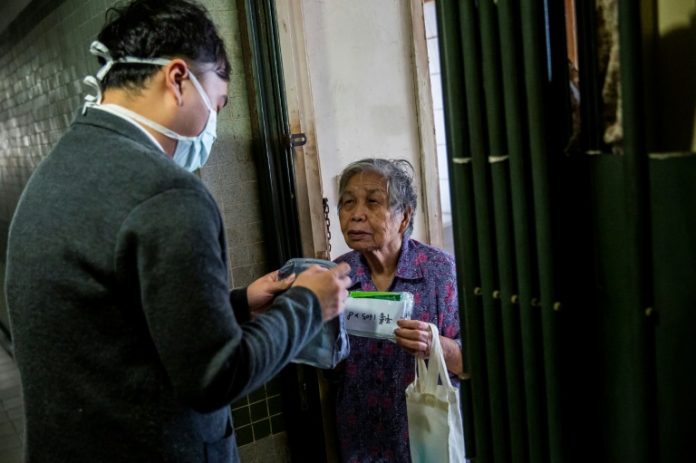Hong Kong’s rival political camps have embraced a new tactic to woo potential voters as the city hunkers down during the coronavirus pandemic: free face masks.
Masks have been in desperately short supply in Hong Kong since the start of the year when the epidemic reached the financial hub.
Politicians from both the resurgent pro-democracy camp and their embattled pro-Beijing rivals have seized on the shortage, beginning a charm offensive with voters even before official campaigning kicks off for the city’s legislature elections in September.
Already riding high after last year’s huge anti-government protests, three pro-democracy parties were the first to pull off something of a public relations coup – securing 1.2 million masks form Honduras.
The move did not go unnoticed, and one week later the pro-Beijing camp announced that had one million masks of their own.

Local councillor Eason Chan said he believed the swift response from the pro-democracy camp to the virus pushed their opponents to up their game.
“That we started earlier and kept bringing supplies to the community, in some ways, forced all parties to join the competition,” he told media.
“The Pro-Beijing camp wants to use this chance to return to the community and reinforce their local support,” he added.
Beijing’s powerful Liaison Office in Hong Kong announced the neighbouring Chinese mainland city of Shenzhen had donated one million masks that were being distributed among the community by a newly-formed group called “Hong Kong Community Anti-Coronavirus Link”.
“As long as the public can be benefitted, it’s fine for different parties in society to do their own part,” said Bunny Chan, a well-connected politician within the pro-Beijing side and one of about 30 conveners of the Link.
“Our conveners have either extensive local networks or professional background, and we have more than 5,000 volunteers across the city to help,” he told reporters.
– Anger at slow response –
Hong Kongers will be able to elect half the lawmakers in the city’s legislature, a body designed to ensure the pro-Beijing block always holds sway.
But after last year’s huge anti-government protests and a landslide victory in November local council elections, the pro-democracy camp have their best chance ever to capture most of the electable seats in the legislature.

And the pro-Beijing block are scrambling to avoid another humiliating defeat.
Eason Chan said sourcing masks to hand out for free was one of the first tasks on his to-do list after he was sworn in as a local councillor for Kwun Tong, a reliably pro-government district until last year’s protests.
The 23-year-old political novice has distributed 10,000 masks since January, gathered through donations and paid for out of his own pocket.
“Mask handouts are closely related to the election in September,” he added.
Beijing continues to full-throatedly back chief executive Lam even though she is grappling with historic low approval ratings.
But many of her allies in Hong Kong’s pro-establishment camp have begun distancing themselves from her administration and even openly criticising it, especially after the virus outbreak.

There has been widespread public anger towards the city’s unelected pro-Beijing leaders over their failure to stockpile supplies in a city traumatised by a 2003 outbreak of the SARS virus that killed more than 300 people.
The COVID-19 disease has so far infected 149 people, four of whom have died.
“It’s become clear that whoever has a close association with the government is doomed,” Chung Kim-wah, a social scientist at the Public Opinion Research Institute told media.
He said the pro-government camp will need to try harder to persuade voters in a city still seething with public anger and clamouring for democratic reform.
“Hong Kong voters have many other and deeper grievances from what happened last year,” he said.
















